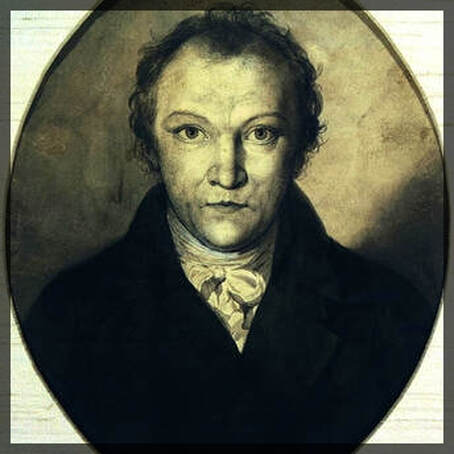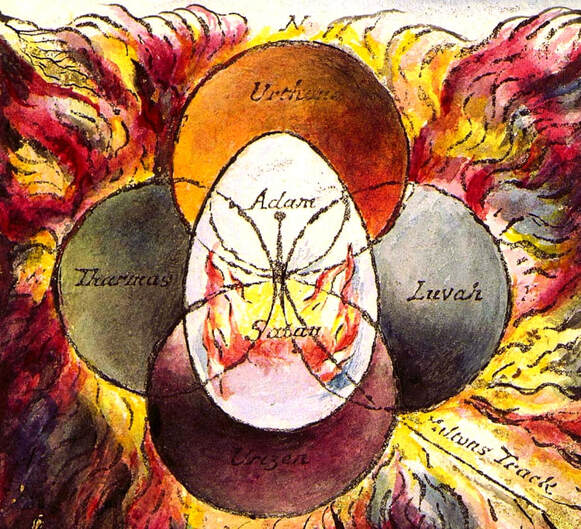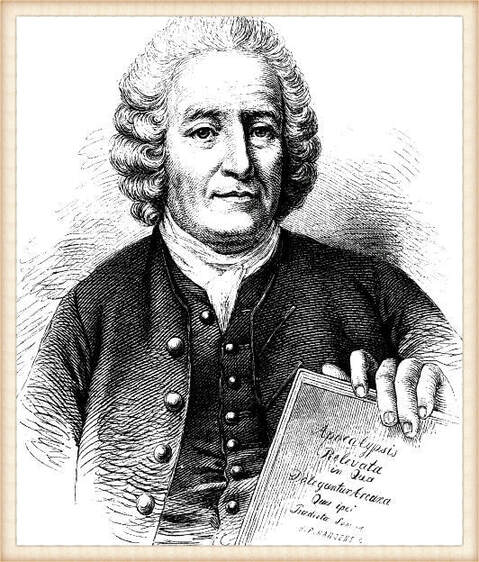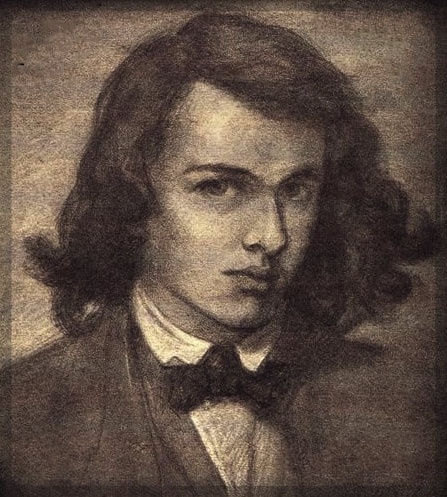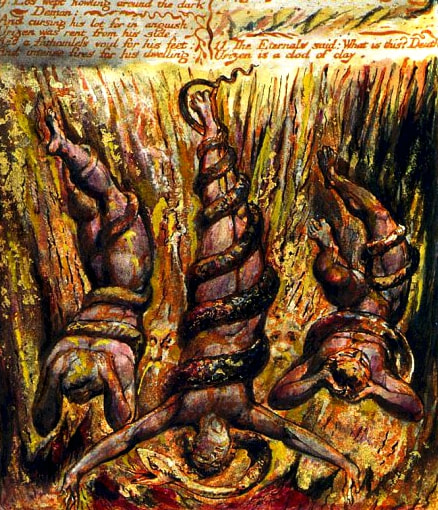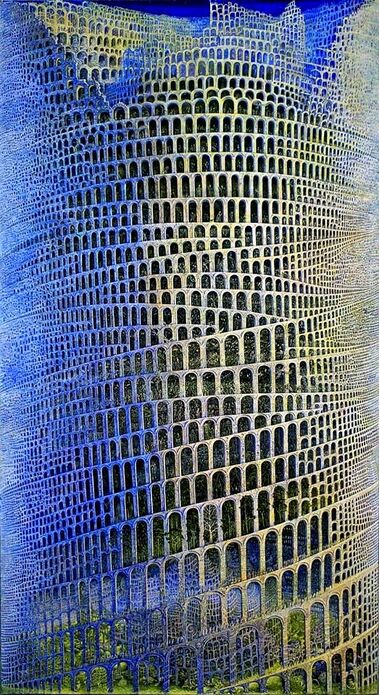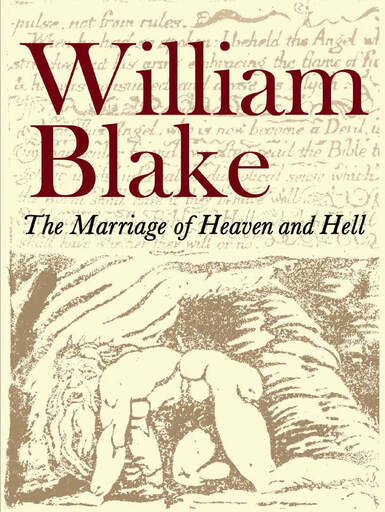The Fall of Albion
.
by Michael Tsarion
|
|
To see the world in a grain of sand, and a heaven in a wild flower, hold infinity in the palm of your hand, and eternity in an hour - William Blake (Auguries of Innocence)
|
|
|
|
As far as William Blake was concerned, it was not man who fell from paradise, but God himself.
In his extraordinary writings, and particularly in The Four Zoas, Blake overturns Jewish and Christian conventions and paradigms about the origin of creation and identity of its alleged maker. In Blake's idiosyncratic corpus the creator god is known as Albion, who by losing contact with his own Selfhood or essence plunges into spiritual darkness. Like all true western mystics, Blake asked important questions about the psyche of God. Like Jacob Bohme and others he queried whether God has an unconscious and a dark side, and if something drastic went wrong in God's thinking. These antinomian questions are avoided, and often considered taboo by Christians and believers. The realm into which Albion falls is referred to as Generation. Below this low plane lies Ulro, a hell-like state into which humans can easily descend never to return. This final descent can be likened to a second or even third state of spiritual fall. However, even in the realm of Generation, where man now exists, things get progressively worse after Albion's fall. This is primarily due to the kind of institutions that arise making spiritual vision impossible. These are Blake's famous "Satanic Mills," which fashion the mind-forged manacles caging the mind of every child and adult. Blake openly accused the Church and State, and other civil institutions for obstructing spiritual aspiration and development. He particularly loathed academies of all kinds, believing that no good ever came from schools and colleges. Albion's fall from paradise - the high level Blake refers to as Eden - gave rise to the lower worlds of Beulah, Generation and Ulro. What Blake means is that with God's fall, heaven itself was voided and is nonexistent. In other words, Christians, Jews, and others, are quite wrong to speak of "higher" worlds or realities to which believers might one day return. For Blake, the fall of Albion gave rise to the only reality that exists, the imperfect world of "Single Vision" and materialism into which we are born. If there's a way out, it's not to be found by perusing religious scriptures or submitting to dogma. Far from it. It's found once we finally unerstand how and why the fall occurred, how Albion lost contact with his essence. Blake's controversial account compromises the view of Gnostics, who also tend to believe in higher and lower realities, and a multiplicity of stages or realms above our known universe. For Blake it's simply a matter of states of consciousness and ways of seeing imprisoning and misdirecting consciousness. The fall is, therefore, of an existential kind, being a matter of gross or perverse outlooks and perspectives. It is also a matter of the diabolical conditioning of minds by psychotic men speaking like angels while behaving like devils. |
|
.
|
|
All Bibles or sacred codes have been the causes of the following errors...That Man has two real existing principles: a Body and a Soul...That energy, called evil, is alone from the body, and that reason, called good, is alone from the soul - William Blake
|
|
|
|
The fall of Albion entailed his fragmentation into four hemispheres or subpersonalities. These separate selves Blake calls Zoas (from a Greek word meaning "Living Beings.")
The Zoas are Urthona, Urizen, Luvah and Tharmas. In some books Blake recasts Urthona as Los and Luvah as the fiery character Orc. While the Zoas rule, Albion sleeps. They impose their separate chaotic rulerships over the psyche due to Albion's weakened, fragmented state. As Aristotle warned, let no single aspect or charateristic of consciousness become dominant, exercising total rule over other aspects. Blake's work illustrates what happens when the Aristotelian mean is overthrown in favor of the control of any autonomous hemisphere of the psyche, be it reason, emotion, instinct or sensation. After their separation the fou Zoas constantly war with one another, each determined to gain or regain supremacy. |
|
|
|
Blake's idiosyncratic vision of the fall is presented in his remarkable work Vala, or the Four Zoas.
|
|
|
|
Having their own identities, each Zoa experiences its own reality. Although omething within them seeks wholeness, their yearning for unification is countered by an urge for independence and self-will. The desire to remain independent and closed-off is apparently stronger in some Zoas than in others.
The four Zoas metaphorically represent the fallen Body of God:
The etymology of their names is also suggestive. Urizen is a play on the terms "reason" and "horizon," while Luvah is clearly near to "love." Tharmas is a play on "thermal" and "terminal." The names of other important characters in Blake's corpus, such as Vala, Los and Orc, are based on similar etymological inventiveness. For example, Los is made from the word sol backwards, while Vala implies a valley and also a veil. Enion resembles the word onion, implying layers and deceptiveness. In this sense we see that Blake's name for God is also highly significant, since Albion is the ancient name of England. One of Blake's greatest abilities as an poetic thinker was to seamlessly blend psychological, mythical and historical elements together. This almost unique ability can confuse readers, and has led many critics to misunderstand Blake. The title of some books, such as America, Europe, Asia, etc, gives some the impression that he speaks solely of historical events and was nothing more than a idealistic social reformer. For Blake history is psychology, and psychology spirituality. He believed that the history of this or that land and its people reflects internal psychic dynamics. He certainly saw the borders between the provinces of Ireland and Britain as indicative of deeper spiritual and psychological divides, many of which need to be there. Ideas of this kind are still not competently understood today. As said, the defiant and separatist mentality of the Zoas soon causes further upheaval and polarization. Eventually the Zoas experience so much inner tension that they undergo further subdivision. From this fall we get four Emanations: Ahania, Enitharmon, Enion and Vala. Given that these four are female, we take it that the original Zoas are male or masculine.
|
|
|
|
Although they stand separate from their Zoas, the Emanations potentially represent the means by which the Zoas return to a holistic state. However, as Blake shows, a great deal stands in the way of the reintegration of Zoa and Emanation. For Blake, what we know as Time is the period that endures until on or the other experiences the consequences of the void within their being for want of their companion. Blake eplores throughout his Prophetic Books how the Zoas and Emanations are to be correctly reconstituted and the causes of the great Fall undone.
Throughout works like The Four Zoas, Blake dissects the reasons why the various Emanations are unable to experience a "Chemycal Wedding" with their Zoas. In this regard his Prophetic Books constitute an entire metaphysical corpus second to none. In other works, with a slightly different and simpler take of psychohistory, Blake makes mention of another Emanation, this time of Albion himself. She is known as Jerusalem. Again, Blake plays on terms, thereby fusing history with myth and psychology. In Jerusalem, his longest poetic undertaking, Blake comes close to the work of various hermeticists, kabalists and alchemists. There is also a happy ending, since Jerusalem succeeds in awakening Albion and "restoring" him to wholeness. Blake's profound Hermetic thought obviously influenced that of the great Carl Jung. Regrettably, this is not the place to extrapolate in detail on the Blakean elements turning up in Jungian theory. All one can say is that they are plentiful. Of course Blake's body of work reveals the influence of Paracelsus, Jacob Bohme, Meister Eckhart and other earlier mystics. Some of his work bears a similarity to that of Kabalists such as Isaac Luria, with his early thought clearly being indebted to that of Emmanuel Swedenborg. |
|
|
|
Swedish mystic and polymath Emmanuel Swedenborg (1688-1772) whose work deeply inspired the young Blake. Later Blake heaped ridicule upon Swedenborg and rejected elements of his thought, particularly those which preserved a Christian and Deist complexion. Blake ridiculed the rationalists, men such as Bacon, Rousseau, Locke, Newton, and others who believed that nature's mysteries are revealed by intellect alone. What good is reason, asked Blake, if it serves to entrap man further in illusion, making us more comfortable in a post-fall nightmare?
|
|
|
|
We see that in many respects, Blake's ideas on the psyche certainly anticipate Jung and other psychologists who continually fail to cite him and his ideas. And although various modern Gnostic societies nominate him as a kind of patron saint, it must be emphasized once again that Blake was not himself a Gnostic, despite the occasional Gnostic leitmotif running through his psychodramas.
Blake's conception of the so-called "unconscious" was certainly ahead of that held by most later psychologists. For Blake the unconscious is understood when we factor in our need to suppress memories of the great fall. The world we inhabit (Generation) came into being due to that spiritual declination, but given our fragile sanity it's not possible to consciously face the utter disaster and ruination which occurred. So energetically exhausting to the soul was the fall, that humans need the peace of sleep every night to rest their being. The unconscious is therefore, in one sense, a state of repose essential to the healing of a danaged psyche. It serves a positive purpose in this regard, but stands as proof that spiritual damage has occurred and that consciousness is in a state of repair from something cataclysmic hitherto unrecorded and unacknowledged by historians and psychologists. This is the piece missed by other pioneers and thinkers - the "Freuds" and "Jungs" whose insight into the origin of consciousness wasn't anything like as profound as Blake's. The division between conscious and unconscious hemispheres was no mystery to Blake. He knew that the supremacy of the Left-Brain and advent of the philosophies of Rationalism and Materialism had the same cause. He alluded to these monstrosities by the colorful terms "Satanic Mills," "Mind-forged Manacles," "Single Vision," "Newton's Sleep" and "Looms of Locke." What Freudians call "repression" was, therefore, no mystery for Blake. Decades prior to the advent of psychoanalysis he understood the purpose and function of "ego-defences." He knew that sanity depends on what we never come to know about ourselves and our history. We cannot afford to be reminded of the horrific cataclysmic events that tore our previous consciousness to shreds and brought us to this darkened imperfect reality. Strangely, as a result of the fall, what we get to see of the world is what our minds allow us to see. As Immanuel Kant discovered, we don't actually experience what's "out there" in a one-to-one manner. We experience only what our minds permit us to experience, and for everything revealed there is something concealed. Blake explained what Kant failed to explain - the reason why this is the case, and why our vision is filtered and inhibited. Blake knew the reasons not only for repression, but also for regression, denial, cognitive dissonance, dissociation, compensation, displacement, association, neuroses, psychoses, and all forms of pathology. Although the unconscious contains the memory of it all, on no account can this memory of wreck and ruin enter consciousness, not unless disguised via artistry. Then, as a tale told to a drowsy child, it does not disturb one into fearful madness. We accept in fable and myth what we dare not accept as history, leaving ourselves free to laugh off the one and nay-say the latter should truth's intrusion compromise our systemic amnesia. |
|
|
|
Dante Gabriel Rossetti (1828-1882). If it were not for Rossetti we'd probably never know about William Blake who was well and truly reviled and hinterlanded during his lifetime. Hearing about the sale of some Blake manuscripts, and poverty stricken as he was, Rossetti borrowed enough cash to run across town and procure the few invaluable documents by his dead hero. Rossetti himself soon became the legendary Pre-Raphaelite poet and artist. He too died tragically.
|
|
|
|
The reason for the fall and frightful condition of consciousness is explained by Blake throughout his prophetic books, which are far superior and insightful than supposedly holy or inspired texts such as the Old and New Testaments, Book of Enoch, Gnostic Gospels, Koran and so on.
Blake's descriptions of Albion's eventual restoration are also of interest. Once again it must be made clear that words like restoration are ultimately unworkable when it comes to Blake's vision, because that which is past isn't being reconstituted in the normal sense. Albion's awakening is only metaphorically conceived as hearkening to a past state. Actually it involves something far more phenomenological, immediate and novel. There is no "return" to anything described as a Godlike condition or supernatural reality transcending ours. Ideas of this sort must be wholly rejected if true progress is to occur. Such concepts are the concoction of priests and are utterly meaningless. What once existed exists no longer. An unchanging supernatural world with a perfect God at its center simply doesn't exist except in the poisoned imaginations of Christians and religiously-minded types with a paltry understanding of what actually occurred to consciousness. As a result of Albion's fall we not only descended into spiritual darkness and mental and physical impotency, but we also fell under the devilish control of the scurrilous religions and governments which set themselves up as supreme authorities in the fallen world. Consequently, what their imperious patriarchs deem unholy or demonic is the opposite for Blake. In the marriage of heaven and hell, it is heaven that benefits most. Blake laments the presence of the black-robed priests who bind his desires and stifle his creativity. He also laments the presence of materialistic scientists who deliver a false vision of nature. They concoct a mundane, desacralized image of the cosmos and of man. They foist upon us what Blake describes as a "Newtonian Sleep," or mentally moribund condition in which we lose all genuine spontaneous wonder at the world around us and all personal psychosomatic sensitivity. The chronically desensitized materialist enters his Newtownian slumber, losing all understanding of his spiritual origins, and of the absolutes in which his being is grounded. Under imposed Single Vision he remains unaware of the great metaphysical inversion that has occurred. For religious types and other believers in progress and ascent, man's ultimate destiny is to become godlike. Religious dogma provides the standardized, authenticated methods for living life in order to please God and win favor. Blake saw through this lie and indicted priests and scientists for colluding in making the horrific conditions of the fall acceptable and even comfortable for the fallen. Striving to return to something that doesn't exist wasn't his idea of a meaningful existence, regardless of how many devious priests endorsed it. |
|
Image from Blake's Book of Urizen
|
|
In Blake's unique iconography and cosmogony, the Zoa known as Urizen is instrumental to maintaining the "Newtonian Sleep." He represents the mental part of Albion which, after the fall, became the supreme reigning authority. Urizen seeks to dominate consciousness, and succeeds despite resistance from other Zoas who think it best if they rule over consciousness instead. Blake's finest poetic and imagistic stanzas refer to and describe Urizen, the "Ancient of Days."
All religion comes into being as Urizen attempts to seize control and stabilize himself after the fall. It exists to preserve what can be preserved of the pre-fallen world, and to formulate and implement the process of restoration. For Blake, however, all that exists of the past are insubstantial memories with little practical value. They merely serve the priests who profit from our confusion, nostalgia and dependence. For Blake, it is axiomatic that we cannot build strong new worlds on a memory. The perverse unilateral thinking that brings about religious dogma later gives rise to materialism and scientism. Urizen imprisons imagination and intuition and establishes the nefarious inhuman institutions of the world, but does not see himself as a devil or architect of evil. As far as he is concerned, his plan of action eventually leads to the restoration of the original godlike condition. Therefore, he alone must be in charge of Albion's revival. Urizen considers his project so utterly vital that he brooks no resistance. All rivals must be defeated and chained. All activities must be meticulously chronicled and preserved, and for that process to succeed great colleges must arise to honor and commemorate the eternal return. In Urizen's world one's merit is awarded for services rendered. Blake saw the world's many figures of authority as disciples of Urizen, obediently and tirelessly carrying out his will and receiving honor for doing so. The cosmos, although a shadow of what was, still contains sparks of Spirit which prevent souls falling into complete everlasting darkness. If encountered correctly, these sparks can form the basis of a new paradisal reality. Consequently, Urizen and those he commands get to work building a new heaven amid the ruins. The priests serve their "god" - the king in crimson. According to Blake, we live in Urizen's simulated universe, and think according to the restrictive inflexible parameters laid down by his agents. In this respect Urizen resembles the Gnostic Demiurge, although as said we are not to consider Blake a Gnostic, which is a common mistake made by many who come across his work but only superficially understand it. Urizen is the great Artifex whose mandate is to rebuild a semblance of what was. However, as his monstrous project advances he meets resistance from other Zoas who no longer believe his way is right. They object to his suppression of freedom and imagination, and reject the oppressive world built in his image demanding total selflessness and unflinching obedience. |
|
|
|
Why do the towering edifices and institutions exist and what are they for? Do they free or enslave the spirit of man?
|
|
|
|
As a superlative psychologist, Blake was all too aware that his many iconic eternals represent aspects of a single consciousness. Existentially speaking, it is clear that for Blake each Zoa or entity also represents a kind of vision - or way of seeing - as to what constitutes man's restoration to wholeness.
For some it is signing on for Urizen's scheme, while for others it is a matter of absolute rebellion against anything and everything demanded by Urizen the crimson tyrant. So it is with Blake's antagonists Los and Orc, the implacable enemies of Urizen. One has only to read his complex and voluminous works to see that he personally identified with Los and Orc, and other agents of rebellion and freedom. For a certain type the solution is to dominate, control and lead. People run amok in a fallen state, lost to themselves, succumbing to neurosis and irrationality. They are their own worst enemies. Best then to corral and regiment them until they know and do better. Don't spare the rod! For others it is a matter of existing in a dreamy poetic bubble, and of adopting a libertine lifestyle. Nothing much can be done about the ruinous condition, but one can always have fun and potter about being "arty." Live and let live...Drop Out Man!...Peace! Another type bellows about imperfection and who is to blame for the dire condition of existence. Get the "People" together man...Down with the system!...Burn the world! Another type throws up their hands and rejects every plan for restoration. After all, since Spirit fell it therefore still animates our precarious world to a degree, however meagerly. Let's not weigh ourselves down with mighty metaphysical pondering, worry or grandiose plans leading only to more mess and difficulty. Nature lies before us in all its bounty, so with a little patience and ingenuity we can make it habitable and even enjoyable. No need to fret over what was lost and what can never be again. The Emanations Vala and Enion in particular represent this passive attitude. Although Blake vehemently attacked science and materialism, he reserved his fiercest diatribes for religion. Maybe Albion's restoration to wholeness is prevented because of the false image of heaven and God presented to us by the institutions of religion. After all, orthodox Christians and Jews don't believe it was God himself who fell into darkness. Moreover, they erroneously believe in a supernatural realm to which souls go after death, a place real and presently existent. As said, for Blake this dogmatic tenet was absolutely false. There is no place above and beyond this world. And what we have in this world is the result of total spiritual collapse. Therefore, talk of some perfect Platonic world, or a "return" to a more perfect spiritual reality only maintains ignorance and priestly control. For Blake there is only one kind of existentially valid religion, that which arises from one's own being. It pertains to no other person and needs no followers, believers or shrines. It is not born from mental folly, and leads in no particular direction or toward any fixed goal. As Blake wrote, it's a matter of which road one decides to walk: the straight road of invention or crooked road of Imagination. Salvation, he knew, lies in one's state of being and way of seeing. |
|
|
|
Blake's most anti-religious work is the Marriage of Heaven and Hell. It is in this book that we find his controversial Proverbs of Hell, and reference to the "Doors of Perception," a passage implying that ignorance is rooted in a choice one makes. For more on Blake and his radical ideas, see my books Disciples of the Mysterium and Schelling. (Here for more...)
|
|
|
|
Blake lived in poverty most of his life, and died in obscurity. He was shunned by London's artistic community and considered mad by many who came across his work. If it were not for his few patrons and in later times the obsessive interest of Dante Gabriel Rossetti, we might never have heard of Blake, since shortly after his death an acquaintance, Frederick Tatham (a Christian), took it on himself to burn a great deal of Blake's unpublished manuscripts and engravings.
|
|
. . .
Michael Tsarion (2020)
